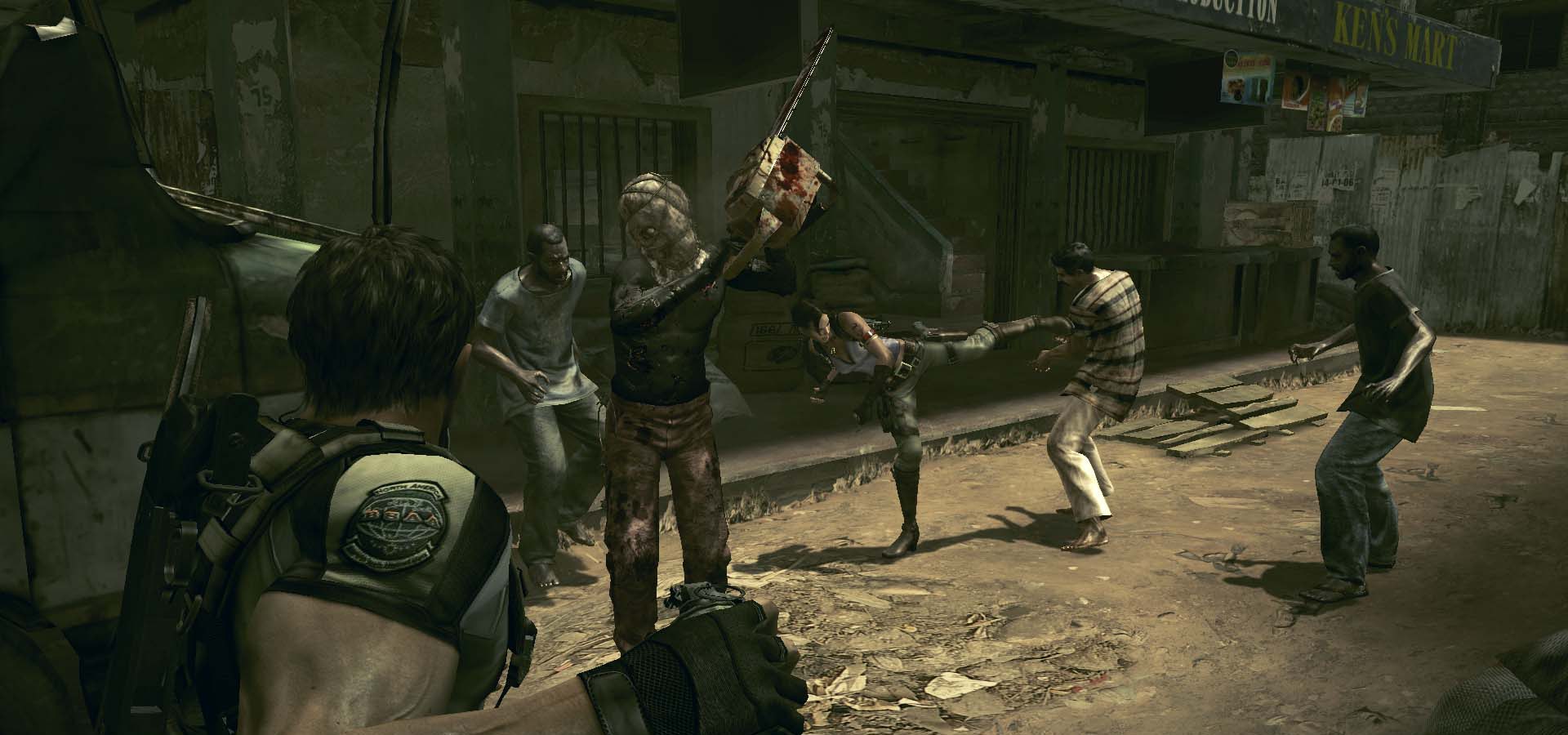
Race, Croal, Conrad and Resident Evil
A funny thing happened to Resident Evil 5 on its way to release: it became the center of a growing debate about race in video games. Of course, this is not shocking really. Not only is Resident Evil one of the few titles to feature a large group of black characters, but it is also one in which those black characters happen to be villains savagely trying to tear your character apart. But wait. That’s a bit too simplistic.
The fifth Resident Evil title leaves behind the Pacific northwest of the United States and dreary Spanish villages for the sun-soaked continent of Africa. In the process, obviously, there has been a significant increase in the number of black characters. You could perhaps set a title in parts of Africa with a mostly white cast, but that would be more than a little disingenuous.
Since most characters are black, and since Resident Evil games usually include legions of zombies on the attack, the zombies in this game end up being black. At least, that’s what the trailers have shown so far. Perhaps there is a secret underground lab with all white scientists, but then that brings up whole other racial stereotype issues.
So, what’s the problem? Aren’t black Africans just as capable of being zombies as white Americans or Spanish people? Sure, why not? It isn’t as if black people have some unique gene preventing them from turning zombie, and there have certainly been black zombies in past games.
Not so fast though, says Newsweek’s N’Gai Croal. While it may be perfectly acceptable to have black zombies, or even to set a horror game in Africa, the footage released so far raises some troubling issues. In an interview with MTV’s Multiplayer blog, Croal admits some hesitations about the title, saying his first reaction was, “Wow, clearly no one black worked on this game.” He continued:
It’s like when you engage that kind of imagery you have to be careful with it. It would be like saying you were going to do some sort of zombie movie that appeared to be set in Europe in the 1940’s with skinny, emaciated, Hasidic-looking people. If you put up that imagery people would be saying, “Are you crazy?” Well, that’s what this stuff looks like. This imagery has a history. It has a history and you can’t pretend otherwise. That imagery still has a history that has to be engaged, that has to be understood. If you’re going to engage imagery that has that potential, the onus is on the creator to be aware of that because there will be repercussions in the marketplace.
N’Gai Croal
The reaction on the Internet to Croal’s comments has been mostly negative. Many have accused him of playing the mythical “race card.” Many more have accused him of simply being a whiner who should get over himself. This reaction raises a couple of interesting questions.
First, why suddenly paint Croal as a traitor to gaming? This is a guy who writes professionally about gaming for the mainstream media. He does so respectfully and intelligently. In fact, most gamers usually praise him. He has one unpopular opinion and the gaming community wants to turn on him? Why not instead consider that he might have a point? Why not give him the benefit of the doubt that he might be on to something? After all, if he is usually sound, isn’t it more plausible that he has a point here, too, rather than simply being off his rocker?
The second question, is why fans of the series have reacted so vehemently to questioning the title. Croal is the second darling of the gaming media to be lambasted in the last couple of weeks for scrutinizing games. Perhaps these people aren’t so far off base. But instead, they are hitting a little too close to home.
Croal’s criticism of the trailer, contrary to how it is often portrayed, is not accusing Resident Evil 5 of racism. Far from it. Croal goes out of his way not to label Capcom as a company or the development team racists. Instead, he works at making the argument that some images can be viewed as culturally insensitive.
Croal points out that even before the villages turn zombie, there are still some unnerving portrayals:
There sort of being, in sort of post-modern parlance, they’re sort of “othered.” They’re hidden in shadows, you can barely see their eyes, and the perspective of the trailer is not even someone who’s coming to help the people. It’s like they’re all dangerous; they all need to be killed. It’s not even like one cute African or Haitian or Caribbean child could be saved. They’re all dangerous men, women and children. They all have to be killed. And given the history, given the not so distant post-colonial history, you would say to yourself, why would you uncritically put up those images?
N’Gai Croal
The convenient rebuttal is to ask, “What about the Spanish? Weren’t they also “othered” in Resident Evil 4?” Croal argues, “The imagery is not the same. It doesn’t carry the same history, it doesn’t carry the same weight. I don’t know how to explain it more clearly than that.” And he’s got a point.
Context matters with any media. The fact that this is a horror game means this isn’t exactly the same as Sony finally releasing their secret Afrika title only to have negative images of the locals presented. Still, most Europeans don’t have quite the same cultural baggage that those of African descent do. He makes an excellent point about old Jewish caricatures–how would they be received? If one has a moment’s hesitation about their presentation, don’t Africans also deserve the same consideration?
Because when Croal talks about post-colonial history he doesn’t just mean what actually happened; he’s also referencing media depictions that have represented Africa to many Western audiences for years. Consider the novel Heart of Darkness, which is often taught in high schools and freshman college literature courses. In 1977, Chinua Achebe famously criticized the novel saying that its depiction of Africa and native Africans was that of “‘the other world,’ the antithesis of Europe and therefore of civilization, a place where man’s vaunted intelligence and refinement are finally mocked by triumphant beastiality.” While there remains some controversy over this reading, it’s become fairly standard to address Achebe’s concerns even in conservative literature classrooms. His critique has even made its way into the vaunted Norton Critical Edition of the novel.
Resident Evil 5, at least in trailers so far, seems to present a similar vision. When the character Chris Redfield walks through the village, the natives run in and out of shadows with only their eyes visible. This is an excellent demonstration of the game’s lighting engine, but is it insensitive to the ways in which Africans and those of African descent have traditionally been represented? If yes, does that mean that blacks can never be the main villain within a video game, or simply that native Africans are off limits? Is it possible that in being offended, some are actually being racist in denying Africans equal representation in games? Are Africans too fragile to be zombies? Can they not handle representations like these which Spanish people and white Americans shrug off?
Again, it isn’t that simple or easy. As Croal points out, no one is accusing Capcom of having racist intentions with the game. On the contrary, most would chalk it up to ignorance on the designers’ part, as most of them are Japanese, and certainly Japan doesn’t have quite the same exploitive historical relationship with Africa as Europe does. Still, ignorance is only an explanation for cultural insensitivity, not a free pass for it. And most copies of Resident Evil 5 will eventually be sold in North America and Europe, not Japan. In these two places, imagery like this, and its attendant hurt, runs deep.
Race is still quite a divisive issue, and many would rather bury their heads in the sand than look at it rationally. But the trailer can, at the very least, be labeled borderline culturally insensitive. How far you go beyond that probably has much to do with your personal background. Some, who have been the victim of racism, will likely see more there than those who have never been victimized. In that way, Resident Evil 5 is opening up a fascinating avenue for dialogue within the gaming community. The final game might even capitalize on these issues by exploring them, and perhaps rendering much of this controversy moot. Regardless of how it turns out, Croal and others opened a can of worms for academic video game criticism and analysis that will likely never close again. And that, is a very positive step toward being accepted as legitimate media.
